Switch to the mobile version of this page.
Vermont's Independent Voice
- News
- Arts+Culture
- Home+Design
- Food
- Cannabis
- Music
- On Screen
- Events
- Jobs
- Obituaries
- Classifieds
- Personals
Browse News
Departments
Browse Arts + Culture
View All
local resources
Browse Food + Drink
View All
Browse Cannabis
View All
-
Business

Cannabis Company Could Lose License for Using…
-
Culture

'Cannasations' Podcaster Kris Brown Aims to 'Humanize'…
-
True 802

A Burlington Cannabis Shop Plans to Host…
-
Business

Judge Tosses Burlington Cannabiz Owner's Lawsuit
-
Health + Fitness

Vermont's Cannabis Nurse Hotline Answers Health Questions…
Browse Music
Browse On Screen
Browse Events
View All
Quick Links
Browse Classifieds
Browse Personals
-

If you're looking for "I Spys," dating or LTRs, this is your scene.
View Profiles
Special Reports
Pubs+More
Kicked to the Curb: After a Year in Hotels, Homeless Vermonters Prepare to Live in Tents and Cars
Published June 16, 2021 at 10:00 a.m. | Updated October 26, 2021 at 9:25 p.m.
Almost every morning, from around 2:30 a.m. until the sun comes up, Norma Cushing stands in the parking lot of the Holiday Inn on Dorset Street in South Burlington, keeping watch over her gray Hyundai Sonata. Cushing is 54, with silver-flecked brown hair and a smattering of freckles across her nose; at the start of the pandemic, she was laid off from her job at Vermont Tent Company.
The Holiday Inn has been Cushing's home for the past eight months. Before that, she told me, she was living out of the Sonata, sleeping in parking garages and at highway rest stops. At the end of this month, when the Holiday Inn stops accepting state vouchers, Cushing will go back to living in her sedan. Recently, she said, there's been a rash of car break-ins at the hotel, and she wants to make sure hers is safe.
"People are getting desperate," she said.
To reduce crowding in shelters at the onset of the pandemic, Vermont officials contracted with nearly 75 lodging establishments across the state, including the Holiday Inn, to house almost anyone below a certain income threshold. The undertaking was a massive expansion of a long-standing program that provides motel rooms to people experiencing homelessness. Before the pandemic, the state might have paid for rooms for up to 2,500 households a year; over the past 15 months, the state has used federal relief funds to shelter a total of nearly 6,000 households in motels, with no restriction on the duration of their stay.
Vermont's response has been lauded nationally as an epidemiological and humanitarian feat. In the early months of the pandemic, the infection rate among the state's unhoused population was less than 1 percent, compared to a 25 percent average infection rate among the homeless nationwide, according to data from the Centers for Disease Control and Prevention. Since March 2020, the state Department of Health has documented fewer than 25 cases of COVID-19 in Vermont's shelters, with no reported deaths.
But at the beginning of this month, the Vermont Department for Children and Families, which directs the motel voucher program, enacted more restrictive guidelines to limit the number of people who are eligible for rooms; on July 1, anyone housed in the motels who doesn't meet the new criteria will be forced to leave. Certain groups — adults 60 and older, households with children, and people who are pregnant or disabled — will be able to remain in the motels until mid-September, after which federal support may or may not continue, depending on the state of the pandemic. Everyone else, an estimated third of the roughly 2,300 people now living in the motels, will be kicked out. Cushing doesn't meet any of the new criteria; hence, her vigil.
"That car is all I've got," she said. "My ticket to work, my house, everything."
Public health experts and housing advocates have sharply criticized the end of the universal voucher program. "We have to ask ourselves whether the only policy option in front of us is returning a large part of our unhoused population to literal homelessness," said Anne Sosin, director of the Center for Global Health Equity at Dartmouth College, who has studied the impact of the pandemic on vulnerable groups in Vermont and New Hampshire. "I think we can expect tremendous dislocation and disruption that will impact not only the people who have benefited from these housing interventions, but our broader communities."
Mairead O'Reilly, an attorney with Vermont Legal Aid who has lobbied for the continuation of the program, believes that the state will soon find itself confronting a new emergency. "The [Gov. Phil] Scott administration has talked about wanting to avoid a humanitarian crisis," said O'Reilly. "These new rules are not going to help us avoid a humanitarian crisis."
This mass displacement will occur, ironically, as the state prepares to spend $102 million of its $2.7 billion windfall from the American Rescue Plan Act to increase shelter capacity and build 600 affordable housing units over the next year. In the meantime, the state's housing shortage remains as dire as ever.
Since last fall, the Champlain Valley Office of Economic Opportunity has distributed more than 450 housing vouchers, funded by the federal CARES Act, which subsidize up to a year's worth of rent for people coming out of homelessness. According to CVOEO executive director Paul Dragon, nearly half of the voucher recipients haven't been able to find apartments. At the end of the month, he said, anyone who won't be eligible to remain in the hotels after July 1 will receive checks for $2,500. "The money is there, but the housing just isn't," Dragon said.
Over the past month, he said, more than half of the Holiday Inn's residents have found permanent housing, made arrangements to live with friends or relatives, or relocated to a different motel. But Dragon anticipates that by the end of June, somewhere between 50 and 75 people will be stuck in limbo — and that's only a fraction of the total number of people who will soon find themselves unhoused. "It's a catastrophe," he said.
After 15 months of guaranteed shelter, those who will be forced to leave the motels on June 30 feel betrayed and forgotten. Many of them have already spent years attempting to navigate the social service bureaucracy, and the prospect of being turned out on the street, no closer to finding stability, has pushed them into a dark place. A man named Marcus, who declined to give his last name out of concern for his safety, told me that he's thought about barricading himself in his room. "This is bullshit," he said. "We were all promised, at the beginning of this, that everyone would come out housed."
Since last September, Marcus, who is 50, has lived at Harbor Place in Shelburne, a motel that Champlain Housing Trust, a nonprofit that develops and manages affordable properties, has operated since 2013. He hasn't been able to find an apartment, he said, but his housing coordinator at CVOEO did recently offer to reimburse him for a plane ticket to go live with an out-of-state family member. Marcus declined. "I thought it was a joke at first," he said. "Guess they figured I could be somebody else's problem." (Dragon told me this was a "recognized practice," called diversion, that attempts to unite people with their support networks.)
And yet, for all of their utility during the pandemic, the motels have not exactly been a panacea. Residents have overdosed and died by suicide; reports of mistreatment by hotel staff are as common as unwashed sheets. These scenarios represent only a slice of what people on the voucher program have experienced over the last year. Across the state, motel denizens have created a sort of whisper network; in the greater Burlington area, for instance, everyone knows which staff members will harass you for no reason and which places freshen the linens each week. Some of those who might be able to extend their vouchers through September say they've been so disillusioned by the substandard conditions that they don't know whether they want to stay at all.
"I've got insects everywhere in my room, these gross little silver things coming up through the floor," said 60-year-old Jean Miller. She moved into Harbor Place at the beginning of May, after stints in several other motels around Burlington.
"I've just been ping-ponged around, one place after another," she said. "Would you want your parents to be treated this way?"
'A Humanitarian Crisis'
Since the start of the pandemic, the motel program has cost roughly $50 million, covered entirely by federal relief dollars; at an average of $80 a night per room, Marcus, at Harbor Place, estimated that the state has spent at least $30,000 just to house him. An expenditure of that magnitude, said Geoffrey Pippenger, senior adviser to the DCF commissioner, is not sustainable over the long term, nor does it address the root causes of homelessness.
"Last summer, some people were saying that we had ended homelessness in Vermont, and I would argue that that's not the case," he told me. "We may have broken the cycle momentarily. But in order to end homelessness, you need to find people safe, stable housing, which has always been our goal."
With funding from the first round of federal stimulus, Champlain Housing Trust spent $18.9 million to acquire and convert three motels into low- and middle-income apartments. According to CEO Michael Monte, 92 new units will become available in Chittenden County within the next six months, and roughly 100 more are slated for completion by the end of next year. But in the interim, Monte said, there simply isn't enough affordable housing in the state to absorb the people leaving the motels.
"The level of support for folks experiencing homelessness has never been higher. But the need has never been higher, as well," he said. Within the past few months, Monte added, Champlain Housing Trust received more than 900 applications for 50 apartments, a stark indicator of demand versus supply.
Residents learned about the new voucher criteria at the end of April, two months before the pandemic program's expiration date. According to the state's 2020 Housing Opportunity Grant Program report, it takes an average of 125 days for people to find stable housing; even if there were a sufficient amount of affordable housing, said Jessica Radbord, an attorney with Vermont Legal Aid, the chances of everyone in the motels finding a place to live within that time frame would still be vanishingly slim. "Now, there's just nowhere for them to go," she said.
For the past few decades, the primary metric for homelessness in Vermont has been the Point-in-Time Count, an annual census of people in motel rooms, in shelters or on the streets on a single winter night. But the survey, Pippenger noted, tends to miss the precariously housed — live-in caregivers, people who are couch surfing, or families who are "doubled up," in the parlance of housing advocates, with another household. During a public health crisis that disproportionately affected people living in close quarters, he said, some of those arrangements became untenable, which shunted people into the motel system who otherwise might not have been on the state's radar. The January 2020 Point-in-Time survey counted 1,110 people experiencing homelessness; by March 2021, the state was providing motel rooms for nearly 2,700 Vermonters.
"I think those numbers were illuminating to a lot of people," Pippenger said. "The pandemic, in many ways, pulled back a wider lens on the scope of housing insecurity in Vermont."
Those insights, it seems, haven't trumped other economic considerations. This spring, as vaccination rates ticked upward and Gov. Scott phased out travel restrictions, the promise of a flush summer and fall tourism season prompted some hotel owners to cut ties with the emergency voucher program, beginning July 1. That left state officials to figure out how to allocate a diminishing number of rooms — by DCF's estimate, anywhere from 150 to 250 fewer than the state had at its disposal during the height of the pandemic.
In April, a committee of legislators and housing policy advocates hashed out a plan to decrease the reliance on motels. Radbord, who helped write the proposal, pushed for a continuation of the open-door motel policy until the state had constructed more affordable housing and expanded its shelter capacity. But that idea, she said, was quashed from the start.
"We were specifically told that we wouldn't be getting right-to-shelter for everyone, but we also weren't going back to the old rules, either," Radbord explained, referring to the more restrictive pre-pandemic criteria for emergency motel vouchers. "So we had to do something that protected the most vulnerable."
Under the federal Administrative Procedures Act, a legislative committee and the secretary of state must review new rules proposed by a state agency before they take effect. In March, the legislature passed a bill that, according to Pippenger, allows the Agency of Human Services to modify and implement policies without first going through the formal vetting process — an emergency provision, said Pippenger, intended to allow DCF to respond quickly to "an evolving public health and housing crisis."
But even in emergency rulemaking, said Radbord, agencies still have to submit new rules to the legislative committee and the secretary of state when they become effective — and since the state began applying the new criteria to anyone who entered the motel system after June 1, those policies are already in play. So far, said Radbord, the agency still hasn't submitted the revised rules, as it is legally required to do. "Upwards of 700 people are going to lose the only shelter they have on July 1," said Radbord. "There's so much at stake here, and abiding by the appropriate procedures is essential. I think they're fundamentally misinterpreting their authority."
For Radbord, a key issue in the development of the new criteria was how the state defined one particular concern: disability. According to the pre-pandemic motel voucher guidelines, only people who received disability benefits were considered "disabled" and therefore eligible for emergency housing. The committee's proposed guidelines, she said, reflected the broadest possible definition of disability, with no caveats that would exclude those who hadn't yet been approved for benefits, a process that can often take years.
But when DCF finalized the rules at the end of April, Radbord was dismayed that the guidelines extended vouchers only to disabled people who already receive benefits or to those who can provide documentation from a health care professional, which she fears might exclude a large swath of the unhoused population.
That ambiguity in the disability criteria could have an immediate effect on Ramon Sanchez, who moved into the Holiday Inn in South Burlington after he was released from Northwest State Correctional Facility last year. Sanchez, who was diagnosed with diabetes last summer, said he hasn't yet been approved for disability benefits; to support himself in the meantime, he found a temporary job at Gardener's Supply in Milton for three weeks in May. At the end of last month, Sanchez said, his caseworker told him he had earned too much money to remain on the state voucher program in June, even though Sanchez was no longer working.
"I need a fridge for my insulin," he said. "I can't sleep out on the street."
Finally, he said, the Probation and Parole Offices agreed to foot the bill for one week at a different hotel in South Burlington; after that, he had to pay for the room out of pocket with his earnings from Gardener's Supply, which he was hoping to use for permanent housing. Every weekday, he said, he calls Economic Services, the division of DCF that coordinates the motel voucher program, at 7:55 a.m., five minutes before the line opens, hoping for any scrap of information that might offer him some clarity.
'It Was Bad, Real Bad'
In the universe of possible solutions to homelessness, providing rooms not designed for long-term habitation is far from ideal. "Motels are not what we really would strive for in terms of housing, for a lot of reasons," said Sosin, the Dartmouth public health researcher.
Some of the more quotidian reasons I heard from residents: a dearth of cooking appliances, insects of various description, rancid food in closets and nightstand drawers. Marcus, the Harbor Place resident who was offered a plane ticket out of Vermont, showed me a picture on his phone (according to Harbor Place policy, nonresident visitors aren't allowed to enter rooms) of an air-conditioning unit in his window, which was caked so thickly with dust that it looked as if it had grown fur. When he attempted to turn the unit on, he said, it spewed debris into his face. (A slightly cleaner window unit in his room, he said, works just fine.)
In this highly concentrated atmosphere, people who struggle with substance-use disorder and other mental illnesses have spiraled and relapsed. At the South Burlington Holiday Inn, 12 residents have overdosed in the past year, three of them fatally, according to South Burlington Police Chief Shawn Burke. Many people housed in motels have already experienced a disproportionate amount of trauma, said CVOEO associate emergency housing program director Chloe Collins, who helped oversee on-site support services for Holiday Inn residents. Even with the presence of mental health providers, she told me, the residents' needs sometimes exceeded CVOEO's capacity to respond.
On a recent evening at the Holiday Inn, I met a young woman smoking in an alcove by the entrance, who introduced herself as Colleen. She told me she'd been moved from the Holiday Inn earlier this month, with two days' notice, and placed in a room at the Quality Inn on Shelburne Road.
"They put me with all these people that I've been trying to stay away from," she said. "It was bad, real bad." She asked whether she could move back to the Holiday Inn, but she said that Economic Services wouldn't allow it.
"I left an abusive relationship, which is how I ended up homeless to begin with," she said. "And basically, Economic Services told me that I'd chosen to be homeless. Like, are you for real? Are you fucking kidding me?" She crushed her cigarette beneath the toe of her Converse. "People shouldn't have to choose between a shitty relationship and having a place to live."
Colleen told me that she felt so unsafe at the Quality Inn that she decided to camp instead. She's now living out of a tent — she wouldn't tell me where, because she's worried about people stealing her stuff — and taking the bus every morning to her job at Dunkin' in Essex. She doesn't sleep much; when she's at work, she worries constantly about whether her belongings will still be there when she gets back. "I'll never take nothing for granted again," she said. "A shower, a place to sleep."
A young woman in a pale blue dress, who said she was 20 years old, nodded in agreement. "I don't know where I'm going at the end of the month," she said. "There's a lot of creepy people in Burlington. That's what scares me most, if I'm out on the streets."
'Take it With a Grain of Salt'
The pandemic voucher program created a strange symbiosis between social service agencies and motel owners. Social workers suddenly had somewhere to house people who might otherwise have been at high risk of contracting COVID-19; hotels that could no longer accept most tourists, due to pandemic restrictions, could pocket an average of $80 a night per room, thus averting financial disaster.
As a result, several people living in the motels told me, staff had no financial incentive to treat them well. "They've just been banking off us," said Colleen, the woman I met at the Holiday Inn.
In some instances, the social service agencies themselves haven't been the most reliable allies. One motel outreach worker at the Committee on Temporary Shelter, an agency in Burlington that provides support for people experiencing homelessness, told me that her supervisors had reprimanded her "for advocating too strongly" for her clients in the motels. The outreach worker, who requested anonymity for fear of jeopardizing her future employment prospects, has experienced homelessness herself — for six months in 2018, she lived at Harbor Place, in the same room now occupied by one of her clients.
In January, the outreach worker learned that the manager of Travelodge on Shelburne Road had forced voucher recipients to sign a contract allowing staff members to conduct room searches without notice. She confronted him, she said, and asked whether she would be subjected to random room checks if she were a regular paying guest. The manager told her that she would not. "That's discrimination, plain and simple," the outreach worker told me. The Travelodge manager then told her supervisor at COTS that she was barred from the property; according to the outreach worker, her supervisor didn't come to her defense. (The management of the Travelodge did not respond to requests for comment.)
Rita Markley, the executive director of COTS, told me that random inspections are standard in shelters. The Travelodge owner, she said, wasn't infringing upon the rights of residents.
"Not all of the motels were excited about housing the people we serve," Markley explained. The job of the motel outreach worker, she continued, was to "preserve the rooms and the relationships with motel staff," not to "antagonize" them. "If we did something that jeopardized the very limited emergency housing for people who have no other place to turn, that would be the antithesis of our mission," said Markley.
While this politic approach may have been necessary to ensure the cooperation of motel owners, the outreach worker said, it effectively punished her clients. "Everything about this program was set up for the convenience of the motels," she said. Once, when she relayed to her supervisor a resident's complaint about staff at a motel, she said, the supervisor warned her that the resident might not be telling the truth. "Her exact words were, 'Take it with a grain of salt,'" the outreach worker told me. "If you dismiss your own clients as not credible, how could you possibly help them?"
When I ran this anecdote by Markley, she seemed nonplussed. "I tell my kids to take things with a grain of salt," she said. Within an hour of my conversation with Markley, the outreach worker was informed that her contract with COTS would be terminated at the end of this month. (After this story was published, Markley told Seven Days that she had not been involved in firing the worker, and that the decision had been made in May — before I interviewed her.)
Motel residents, too, have complained that they feel belittled by those who claim to support them. One afternoon, I was sitting on a cinder-block stoop outside one of the units at Harbor Place with a woman named Mindy, a survivor of domestic violence, who asked that her last name be withheld. She was telling me about the frustrations of searching for an apartment with her CARES Act voucher when a Champlain Housing Trust employee, Josh Headrick, approached us.
"Is someone smoking weed out here?" he asked loudly. A few months ago, Harbor Place had adopted a no-substance rule to support people in recovery, which came as an unwelcome surprise to some residents. Mindy and I were the only people outside, and all I could smell was her cigarette. We shook our heads. Headrick, visibly agitated, persisted. "If you don't smell marijuana, then there's something seriously wrong with your head," he said.
Mindy told him, again, that she wasn't smoking weed. Headrick asked us to walk over to where he was standing, and sniff. We obliged. I said I detected only a faint note of pot; Headrick stormed off toward the motel office. "I'm not smoking any marijuana!" Mindy called after him. Headrick yelled back, "Just fucking drop it!"
Mindy told me that her sense of smell has been impaired since her ex-husband bashed her face several years ago. That incident, she said, happened at Harbor Place. "Josh knows exactly what's wrong with me," she told me. She was so upset by the interaction, she later said, that she didn't come out of her room for two days.
A few days after that encounter, I spoke on the phone with Headrick, who helps coordinate housing and support services for residents of Harbor Place, and his supervisor, Mike Ohler. Headrick denied that he had cursed, or that he was specifically questioning Mindy about the pot smell; he also disputed my recollection that he'd said there must be "something seriously wrong" with us if we couldn't smell the pot.
Headrick said he hadn't been aware that his actions had been so upsetting to Mindy. Ohler chimed in: "If the perception of the client is that she was targeted, that's something we can address."
"You know," said Headrick, "what this makes me want to do is go back out to Harbor Place today. This just feels important enough for me to talk to Mindy and listen to her."
Later that day, Mindy told me that Headrick had come to Harbor Place and apologized to her profusely. Specifically, he said he was sorry for cursing at her.
'Everybody's So Uptight Right Now'
Nearly every Wednesday afternoon since January, an informal support group has gathered at the Hilltop Inn in Berlin, a squat brick building that overlooks a busy intersection near Interstate 89. The organizers are two residents of Barre's Pierre Motel: Tammy Menard and a woman who asked to be identified only by her first name, Tina, out of concern for her safety and her job prospects, which she fears will be compromised if prospective employers find out she's homeless.
Menard and Tina split the $10 taxi fare each way from the Pierre to meet with residents of the Hilltop, offering them a space to commiserate and express their anxieties as the end of the month looms closer. "Everybody's so uptight right now," said Menard. "Nobody can get a job because they don't know where they'll be living in a month, or if they'll be able to take showers to get clean for work, or how they'll even be able to get to work."
On a late May afternoon at the Hilltop, half a dozen residents had gathered around a table in the motel's breakfast lounge, a green-paisley carpeted room overlooking the parking lot, to share a moment of communal malaise.
That morning, while she was sitting on her stoop at the Pierre, Menard told the group, a caseworker from Good Samaritan Haven pulled up and asked whether she knew of anyone who needed camping supplies for the end of the month. A woman with blond hair and worried eyebrows named Iris Peppin said she'd already seen encampments "down by the wires."
Menard, whose husband is on disability, will be able to extend her voucher through mid-September, but the thought of that caseworker preparing a list of people who need tents struck her as profoundly horrible. "What happened to that money they were supposed to use to house us?" Menard said. "Did they spend it all in meetings, doing — that word I hate — 'collaborating'?"
Tina nodded. "Collaboration is a way of avoiding transparency," she said solemnly.
About half an hour into the meeting, two police cruisers pulled up to the entrance, and Peppin got up and left the room. A few minutes later, she reappeared with a brown dachshund, whom she introduced as Cannoli. "He gets upset when the officers knock on the doors," she explained.
After several minutes of prancing around our feet, Cannoli vaulted his cylindrical mass onto Peppin's lap, then summited the table. He stood there, whining furiously.
"Cannoli! Stop it!" Peppin hissed. "Stop complaining! Nobody wants to hear your stories!"
The general sentiment among the residents in the breakfast lounge was that nobody wanted to hear their stories, either — not the motel staff, who didn't fix Peppin's window for three weeks, in the dead of winter, after someone smashed the glass with a rock; not the social service agencies, who only seemed to respond to their paperwork with more paperwork.
Tina had just learned that she'd been placed on a waiting list for a housing voucher, but her caseworker told her she had no idea when her name might come up. Within the last year and a half, Tina had already lost three jobs, including a part-time remote gig at a private eldercare company in Stowe that would have paid $20 an hour, because of her chronically provisional living situation — first in transitional housing, then in the motel system.
Tina's caseworker, meanwhile, didn't like the idea of her working part time. "She wanted me to get a full-time job at a Dollar General," said Tina. "I've owned my own business. I've worked in the nonprofit world for years. And now, nobody takes me seriously." Tina is 57, just three years shy of the age cutoff for extending her voucher. After June 30, she has no idea where she'll go.
She sighed. "I feel like we've become invisible."
Got something to say?
Send a letter to the editor
and we'll publish your feedback in print!
About The Author

Chelsea Edgar
Bio:
Chelsea Edgar is a staff writer for Seven Days, and has written for BuzzFeed and Philadelphia magazine.
Chelsea Edgar is a staff writer for Seven Days, and has written for BuzzFeed and Philadelphia magazine.
More By This Author
Latest in Coronavirus
Speaking of...
-

Problems at the Cortina Inn Raise Questions About the State's Emergency Housing Program
Jul 17, 2024 -

Goddard College Campus Is Back on the Market
Jul 16, 2024 -

Affordable Housing Developer to Buy Barre City Motel
Jul 9, 2024 -

Queen City Officials Ask Surrounding Towns for Help Confronting the Homelessness Crisis
Jun 26, 2024 -

Burlington Officials Outline Plan for Water, Portable Toilets at Encampments
Jun 11, 2024 - More »


























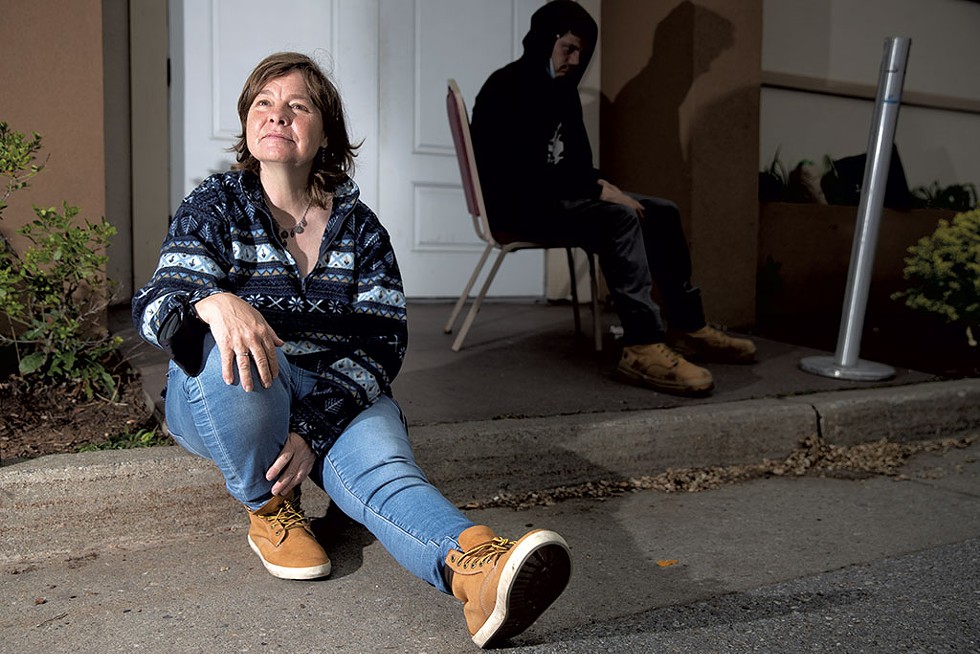
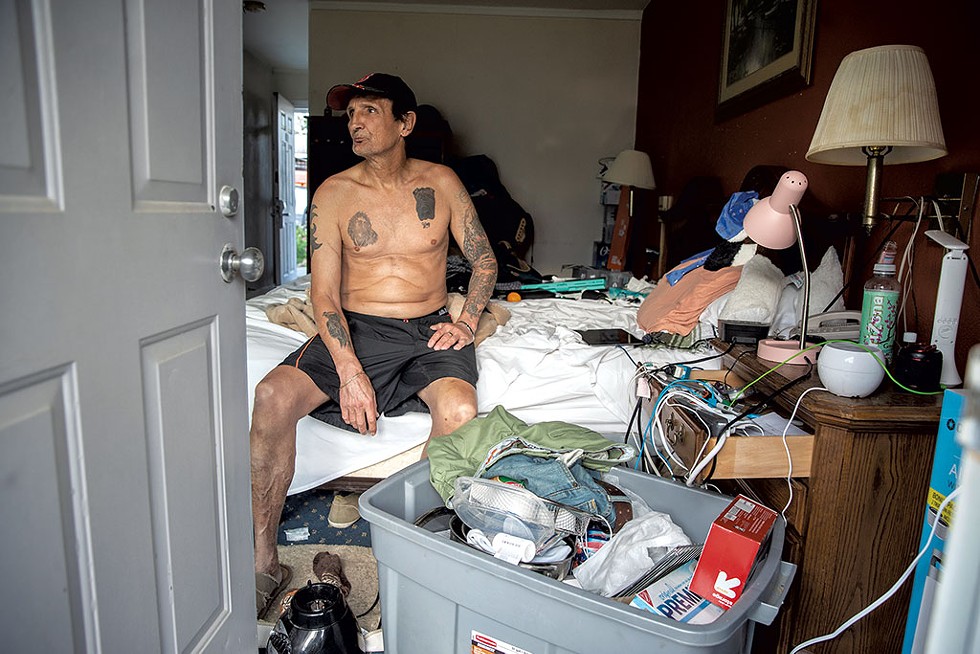
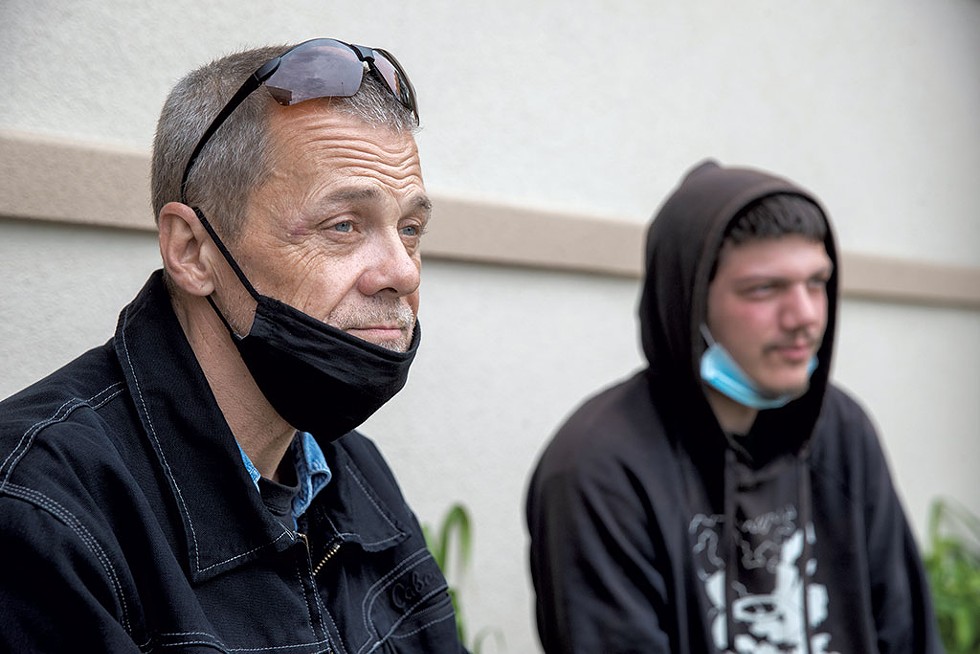
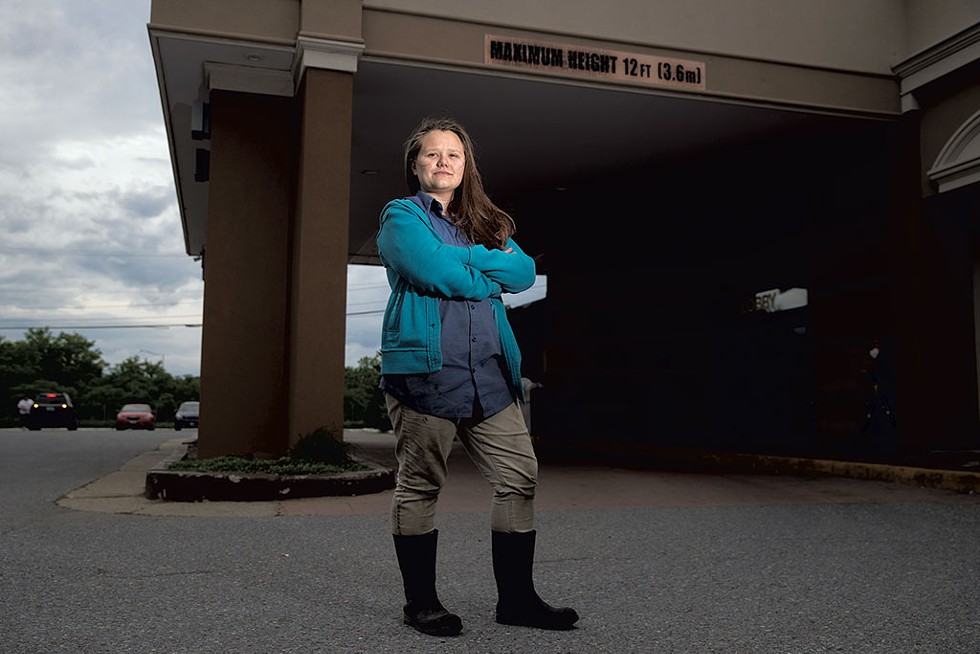






























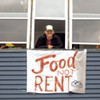




find, follow, fan us: